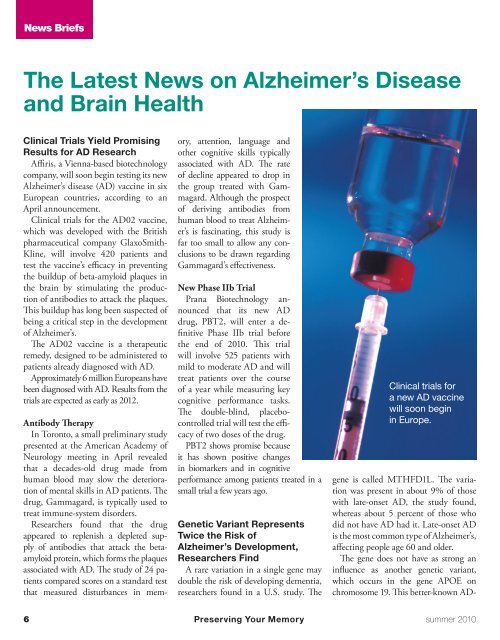Tracie Thoms - Fisher Center for Alzheimer's Research Foundation
Tracie Thoms - Fisher Center for Alzheimer's Research Foundation
Tracie Thoms - Fisher Center for Alzheimer's Research Foundation
Create successful ePaper yourself
Turn your PDF publications into a flip-book with our unique Google optimized e-Paper software.
News Briefs<br />
The Latest News on Alzheimer’s Disease<br />
and Brain Health<br />
Clinical Trials Yield Promising<br />
Results <strong>for</strong> AD <strong>Research</strong><br />
Affiris, a Vienna-based biotechnology<br />
company, will soon begin testing its new<br />
Alzheimer’s disease (AD) vaccine in six<br />
European countries, according to an<br />
April announcement.<br />
Clinical trials <strong>for</strong> the AD02 vaccine,<br />
which was developed with the British<br />
pharmaceutical company GlaxoSmith-<br />
Kline, will involve 420 patients and<br />
test the vaccine’s efficacy in preventing<br />
the buildup of beta-amyloid plaques in<br />
the brain by stimulating the production<br />
of antibodies to attack the plaques.<br />
This buildup has long been suspected of<br />
being a critical step in the development<br />
of Alzheimer’s.<br />
The AD02 vaccine is a therapeutic<br />
remedy, designed to be administered to<br />
patients already diagnosed with AD.<br />
Approximately 6 million Europeans have<br />
been diagnosed with AD. Results from the<br />
trials are expected as early as 2012.<br />
Antibody Therapy<br />
In Toronto, a small preliminary study<br />
presented at the American Academy of<br />
Neurology meeting in April revealed<br />
that a decades-old drug made from<br />
human blood may slow the deterioration<br />
of mental skills in AD patients. The<br />
drug, Gammagard, is typically used to<br />
treat immune-system disorders.<br />
<strong>Research</strong>ers found that the drug<br />
appeared to replenish a depleted supply<br />
of antibodies that attack the betaamyloid<br />
protein, which <strong>for</strong>ms the plaques<br />
associated with AD. The study of 24 patients<br />
compared scores on a standard test<br />
that measured disturbances in memory,<br />
attention, language and<br />
other cognitive skills typically<br />
associated with AD. The rate<br />
of decline appeared to drop in<br />
the group treated with Gammagard.<br />
Although the prospect<br />
of deriving antibodies from<br />
human blood to treat Alzheimer’s<br />
is fascinating, this study is<br />
far too small to allow any conclusions<br />
to be drawn regarding<br />
Gammagard’s effectiveness.<br />
New Phase IIb Trial<br />
Prana Biotechnology announced<br />
that its new AD<br />
drug, PBT2, will enter a definitive<br />
Phase IIb trial be<strong>for</strong>e<br />
the end of 2010. This trial<br />
will involve 525 patients with<br />
mild to moderate AD and will<br />
treat patients over the course<br />
of a year while measuring key<br />
cognitive per<strong>for</strong>mance tasks.<br />
The double-blind, placebocontrolled<br />
trial will test the efficacy<br />
of two doses of the drug.<br />
PBT2 shows promise because<br />
it has shown positive changes<br />
in biomarkers and in cognitive<br />
per<strong>for</strong>mance among patients treated in a<br />
small trial a few years ago.<br />
Genetic Variant Represents<br />
Twice the Risk of<br />
Alzheimer’s Development,<br />
<strong>Research</strong>ers Find<br />
A rare variation in a single gene may<br />
double the risk of developing dementia,<br />
researchers found in a U.S. study. The<br />
Clinical trials <strong>for</strong><br />
a new AD vaccine<br />
will soon begin<br />
in Europe.<br />
gene is called MTHFD1L. The variation<br />
was present in about 9% of those<br />
with late-onset AD, the study found,<br />
whereas about 5 percent of those who<br />
did not have AD had it. Late-onset AD<br />
is the most common type of Alzheimer’s,<br />
affecting people age 60 and older.<br />
The gene does not have as strong an<br />
influence as another genetic variant,<br />
which occurs in the gene APOE on<br />
chromosome 19. This better-known AD-<br />
6 Preserving Your Memory summer 2010






